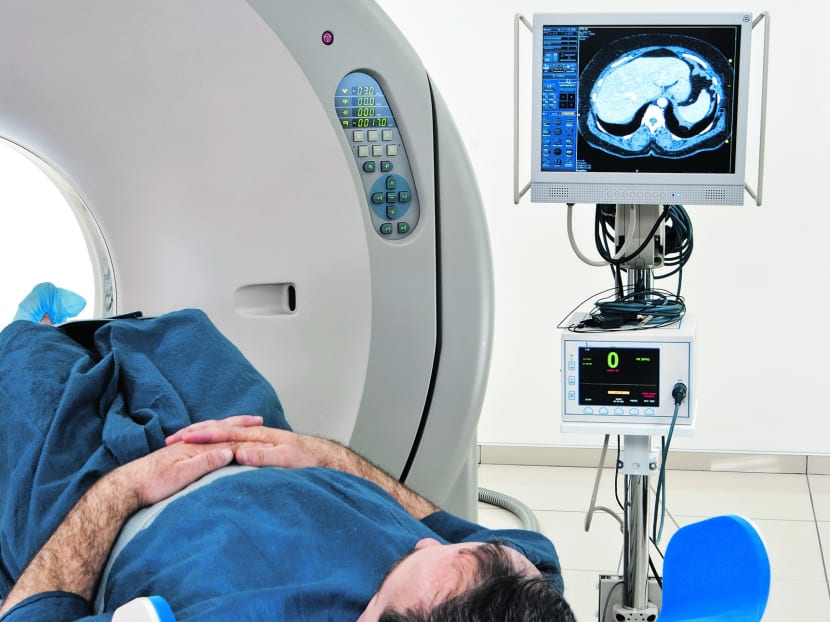PET scans could predict extent of recovery from brain injury, trials show
LONDON — Doctors believe they may have found a reliable way to assess whether patients in a vegetative state after a severe brain injury are likely to wake up, raising ethical questions about the best treatment for those in an unresponsive state.


LONDON — Doctors believe they may have found a reliable way to assess whether patients in a vegetative state after a severe brain injury are likely to wake up, raising ethical questions about the best treatment for those in an unresponsive state.
In a hospital trial, brain scans using PET technology — positron emission tomography — identified hidden levels of consciousness in a third of patients who had been unresponsive and diagnosed as in a vegetative state for more than a year. Most of these “woke up” or moved to a more responsive state within 12 months.
The results of the four-year trial — which took place in a specialist hospital in Belgium, with patients from all over Europe including the United Kingdom — raise ethical questions and could change clinical practice.
If the testing proves to be as accurate as it appears, there may be an argument for such patients to be treated differently — doctors might want to reconsider their need for painkillers, for instance. But there could also be a strengthened case for switching off life support for those in whom no consciousness is detected.
The doctors at the University of Liege carried out the trial to establish whether PET scans or another form of brain scan using functional magnetic resonance imaging (fMRI) were more reliable predictors of recovery than the assessments by doctors using standardised bedside tests. Those result in up to 40 per cent of patients being misdiagnosed.
In the latest trial, involving 126 patients, the results of which have been published in the Lancet medical journal, 41 were in a persistent vegetative state, 81 were in a minimally conscious state and four had locked-in syndrome. PET correctly predicted the extent of recovery in the following year in 74 per cent of patients and fMRI in 56 per cent.
Prof Steven Laureys from the University of Liege, who led the study, said a third of the patients referred to them by doctors elsewhere had been misdiagnosed. Of 41 patients whose doctors had diagnosed a vegetative state, 13 were found by a PET scan to have some level of consciousness. Of the 13, nine regained consciousness within the year, three died of other causes such as pneumonia and only one was still in a vegetative state.
Doctors did not always carry out the bedside diagnostic test that they should, said Prof Laureys.
“We are working very hard to make all centres seeing these patients use that cheap behavioural test,” he said. “If not, you miss about a third of the patients with signs of consciousness. Then, in addition, there’s about a third of the patients who will show signs using functional imaging.”
It was surprising that the basic assessments were not properly done, he said. “Unfortunately these patients are kind of neglected by medicine and society as a whole. He (the patient) often has not seen a medical doctor or specialist for years.”
PET scans were used for cancer patients but had not been employed to detect consciousness in brain-injured patients because of the cost, said Prof Laureys. But he hoped, if other research supported their findings, that PET and other tests including fMRI would become the norm.
In a commentary in the journal, two experts, Professor Jamie Sleigh from the University of Auckland and Dr Catherine Warnaby from the University of Oxford, said more accurate diagnosis and prognosis were needed — “for example, intensive care doctors caring for former racing driver Michael Schumacher after his recent serious brain injury refused to offer any firm prognosis to the world’s media,” they wrote.
The work by the team at Liege is a signpost for future studies, they said. “Functional brain imaging is expensive and technically challenging, but it will almost certainly become cheaper and easier. In the future, we will probably look back in amazement at how we were ever able to practise without it.”
Other scientists were enthusiastic about the results. “This really exciting study suggests for the first time that a brain scanning technique called PET could be used in the future to predict the likelihood that a patient may wake-up a long time after a severe brain injury,” said Dr Michael Bloomfield, clinical research fellow at the Medical Research Council Clinical Sciences Centre in London.
“If the results of this study are confirmed in future research, this could have far-reaching clinical, ethical and legal implications, including whether to offer an apparently unconscious patient pain relief and, ultimately, whether treatments that may be keeping someone alive should be continued or not.”
Professor Martin Monti from the departments of psychology and neurosurgery at the University of California, Los Angeles, said: “This new report marks a long-awaited first step towards translating cutting-edge science into clinical practice.”
THE GUARDIAN





